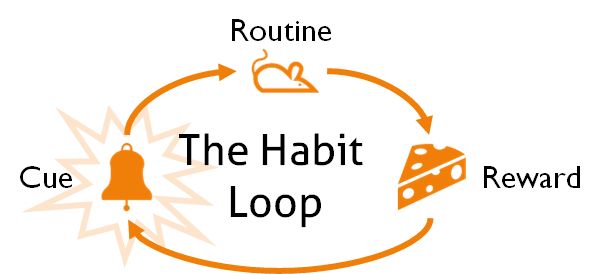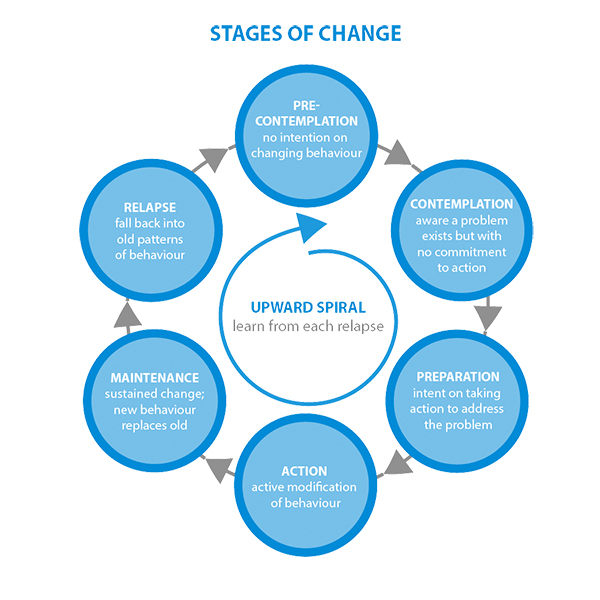We have discussed the way the brain thinks to make a decision. However, to speed decision making our brain sets up short cuts – that become unconscious or addictive. Hopefully you are now more aware of what’s happening when you react so that you have more choices on how to react. But the hard work is breaking out of the short cut – from trigger to reaction. In many ways Addictions are well trodden paths to deal with triggers, emotions and the desire for connection.
The Habit Loop
(Charles Duhigg, The Power of Habit)
- Cue. A trigger that tells your brain to go into automatic mode, and which routine to use.
- Routine. Physical, mental, or emotional behaviour that follows the cue.
- Reward. A positive stimulus that tells your brain that the routine works well, and is worth remembering.
A habit can only be changed if a new routine is successfully inserted into the process with the same cue and the same reward. The goal of breaking habits and addictions is to find these short cuts, and build new paths, more healthy paths for the same triggers.
Addictions – the well-trodden path
One way of looking at addictions IS to see them as form of Idolatry. For the alcoholic the bottle becomes an Idol. And idolatry comes in many different forms, some of which we’re quite accustomed to recognise. So, there are nondrug addictions, such as addictions to gambling, sex, or money. All people are broken people and flawed, but the addict cannot hide it anymore, whereas the rest of us can hide behind our masks of composure. Are you powerless before or after the first drink, activity etc? (Peck, 2012)
Furthermore, it’s not that you have disappointed others repeatedly, it’s the string of disappointments have caused them to lose trust in you. They doubt your competency, they don’t respect or trust your promises, and this affects the whole relationship. The problems are almost never contained in the behaviour of the offender. They’re much more likely to be contained in what happens afterwards. (Patterson, et al., 2011)
When we have an emotion, we can short-cut to an action (acting out) or short cut to avoidance and internal bottling up of the emotion (acting in). Acting out is when the emotion drives a behaviour outside your consciousness. It’s when you do something but don’t know why. Acting in often results in psycho-somatic diseases.
Cycle of Addiction (more coming soon)
Changing identity is key to changing the rut
“A person who believes they have developed a drug addiction can clearly change. But a person who believes himself to be a drug addict will usually return to the use of drugs. Being a recovering drug addict, or drug free doesn’t change the identity, but when they use a clean / new identity -·then that’s when their behaviour changes (Robbins, et al., 1992)
“The kind person other people perceive you to be controls their responses to you. Often this has nothing to do with your true character. For example, if a person sees you as a crook, even if you are an honest person and do good things, this person will search for a sinister motive behind your acts. What’s worse than that after making a positive change, we often allow others in our environments that have not changed their image of us to anchor our own emotions and beliefs back to our old behaviours and identities.”
One shift in identity can cause a shift of your entire master system.
Stages of Change
https://www.verywellmind.com/the-stages-of-change-model-of-overcoming-addiction-21961
Breaking Habits
http://charlesduhigg.com/need-to-break-a-bad-habit/
Dealing with Relapses / Stumbles (more coming soon)
https://www.addictionsandrecovery.org/relapse-prevention.htm

